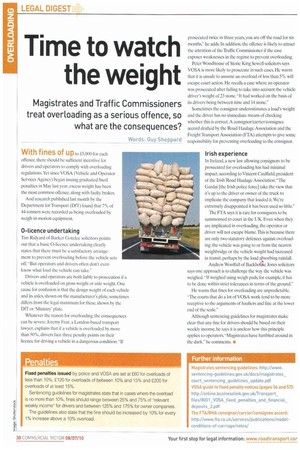Time to watch the weight
Page 30

If you've noticed an error in this article please click here to report it so we can fix it.
Magistrates and Traffic Commissioners treat overloading as a serious offence, so what are the consequences?
Words: Guy Sheppard
With fines of up t. L..5,000 for each offence, there should be sufficient incentive for drivers and operators to comply with overloading regulations. Yet since VOSA (Vehicle and Operator Services Agency) began issuing graduated fixed penalties in May last year, excess weight has been the most common offence, along with faulty brakes.
And research published last month by the Department for Transport (DfT) found that 7% of 44-tonners were recorded as being overloaded by weigh-in-motion equipment.
0-licence undertaking
Tim RkLard of Barker Gotelee solicitors points out that a basic 0-licence undertaking clearly states that there must be a satisfactory arrangement to prevent overloading before the vehicle sets off. -But operators and drivers often don't even know what load the vehicle can take.
Drivers and operators are both liable to prosecution if a vehicle is overloaded on gross weight or axle weight. One cause for confusion is that the design weight of each vehicle and its axles, shown on the manufacturer's plate, sometimes differs from the legal maximum for these, shown by the DfT or 'Ministry' plate.
Whatever the reason for overloading, the consequences can be severe. Jeremy Fear, a London-based transport lawyer, explains that if a vehicle is overloaded by more than 50%, drivers face three penalty points on their licence for driving a vehicle in a dangerous condition. -If
prosecuted twice in three years, you are off the road for six months," he adds. In addition, the offence is likely to attract the attention of the Traffic Commissioner if the case exposes weaknesses in the regime to prevent overloading.
Peter Woodhouse of Stone King Sewell solicitors says VOSA is more likely to prosecute in such cases. He warns that it is unsafe to assume an overload of less than 5% will escape court action. He recalls a case where an operator was prosecuted after failing to take into account the vehicle driver's weight of 23 stone. "It had worked on the basis of its drivers being between nine and 14 stone.
Sometimes the consignor underestimates a load's weight and the driver has no immediate means of checking whether this is correct.A consignor/carrier/consignee accord drafted by the Road Haulage Association and the Freight Transport Association (ETA) attempts to give some responsibility for preventing overloading to the consignor.
Irish experience
In Ireland, a new law allowing consignors to be prosecuted for overloading has had minimal impact, according to Vincent Caulfield, president of the Irish Road Haulage Association. "The Gardai [the Irish police force] take the view that it's up to the driver or owner of the truck to implicate the company that loaded it. We're extremely disappointed it has been used so little" The ETA says it is rare for consignors to be summonsed to court in the UK. Even when they are implicated in overloading, the operator or driver will not escape blame. This is because there are only two statutory defences against overloading: the vehicle was going to or from the nearest weighbridge or the vehicle weight had increased in transit, perhaps by the load a,bsorbing rainfall. .• Andrew Woolfall of Backhotie Jones solicitors
says one approach is to challenge the way the vehicle was weighed. "if weighed using weigh pads, for example, it has to be done within strict tolerances in terms of the ground.
He warns that fines for overloading are unpredictable. "The courts that do a lot of VOSA work tend to be more receptive to the arguments of hauliers and fine at the lower end of the scale."
Although sentencing guidelines for magistrates make clear that any fine for drivers should be based on their weekly income, he says it is unclear how this principle applies to operators.-Magistrates have fumbled around in the dark,he comments.




























































































































